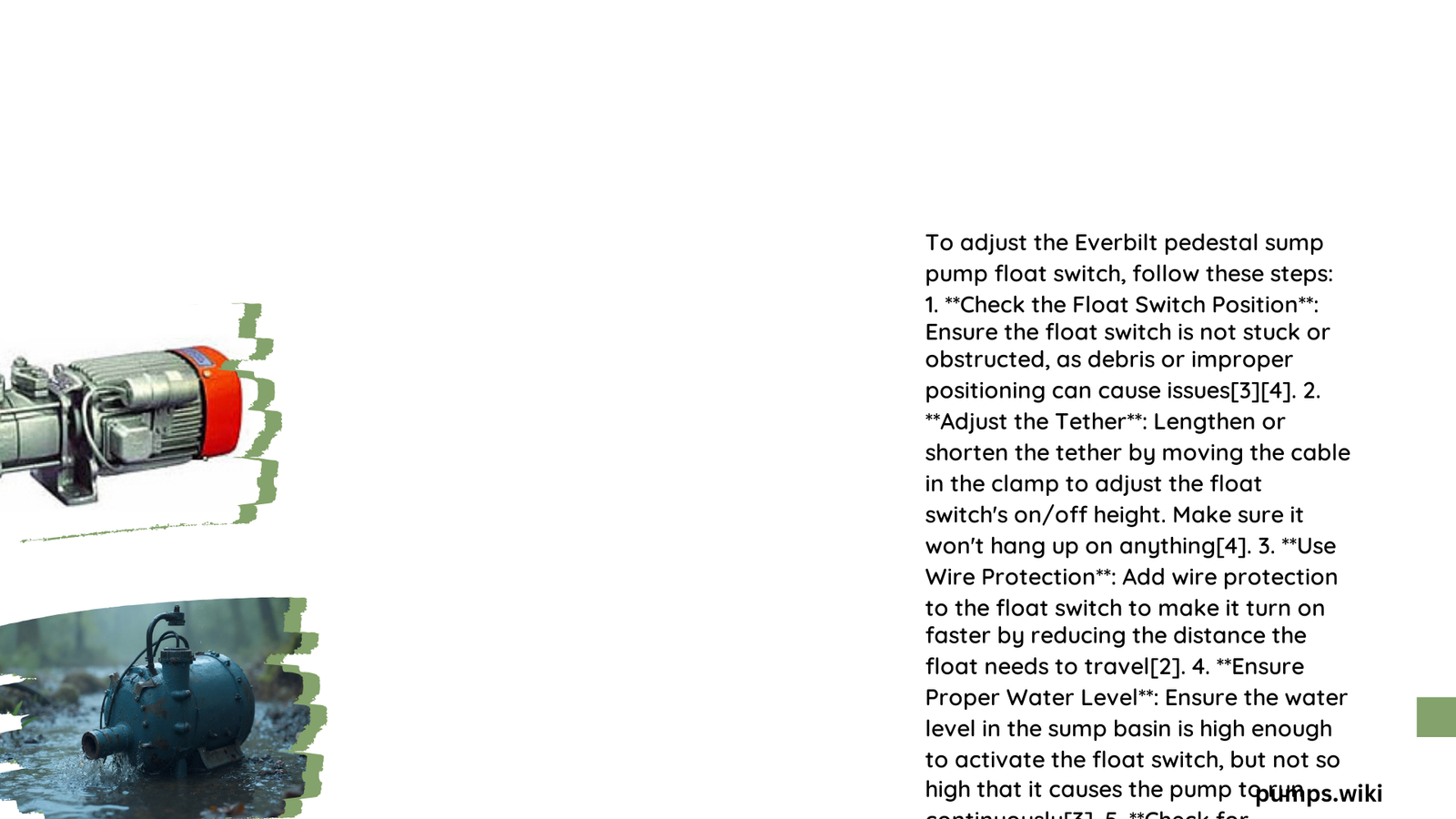Everbilt pedestal sump pump float switch adjustment is crucial for maintaining optimal pump performance and preventing basement flooding. This process involves setting the correct water level activation points for the pump to turn on and off. Proper adjustment ensures efficient operation, extends pump lifespan, and provides reliable protection against water damage. This guide will walk you through the step-by-step process of adjusting your Everbilt pedestal sump pump float switch, troubleshooting common issues, and optimizing its performance.
What Tools Are Needed for Everbilt Pedestal Sump Pump Float Switch Adjustment?
To adjust the float switch on your Everbilt pedestal sump pump, you’ll need the following tools:
- Everbilt Vertical Float Switch
- Brackets and clamps (provided with the switch)
- Rubber grommet
- Adjustable tether or wire (if necessary)
- Screwdriver (flathead or Phillips, depending on your model)
- Pliers (for tightening clamps)
Having these tools on hand will ensure you can complete the adjustment process smoothly and efficiently.
How to Install and Adjust the Everbilt Pedestal Sump Pump Float Switch?

Follow these steps to properly install and adjust your Everbilt pedestal sump pump float switch:
- Assemble the Float Switch:
- Attach the float to the switch arm
- Connect the switch arm to the main switch body
-
Ensure the rubber grommet is securely in place at the bottom
-
Install the Float Switch:
- Mount the float switch to the discharge pipe using the provided brackets and clamps
-
Position the switch so that the float can move freely without obstruction
-
Adjust the Float Height:
- Move the rubber grommet to set the on/off height
- Ensure the water level is at least 1 inch above the pump’s discharge
- Adjust the tether or wire connected to the float to set the desired water level
-
Aim for a typical on/off span of approximately 4 inches
-
Ensure Proper Placement:
- Position the float switch away from direct contact with drains to avoid debris buildup
- Allow the float to rise and fall freely without any obstructions
What Are Common Issues with Everbilt Sump Pump Float Switches and How to Troubleshoot Them?
Here’s a table outlining common issues, symptoms, causes, and solutions for Everbilt sump pump float switches:
| Issue | Symptom | Cause | Solution |
|---|---|---|---|
| Float Switch Stuck | Pump doesn’t turn on/off as expected | Obstructions or debris | Remove obstructions, clean switch |
| Float Switch Failed | Pump doesn’t turn on/off | Switch malfunction | Replace float switch or entire pump |
| Water Level Issues | Pump starts/stops too often | Backflow or overwhelming inflow | Install check valve, upgrade pump |
| Circuit Breaker Trips | Breaker trips when pump starts | Debris, undersized breaker, wrong cord | Remove debris, check breaker/cord |
What Is the Recommended Float Switch Height Adjustment for Everbilt Pedestal Sump Pumps?
The optimal height adjustment for the Everbilt Vertical Float Switch is crucial for efficient operation:
- Set the water level at least 1 inch above the pump’s discharge
- Aim for an on/off span of approximately 4 inches
- Adjust by moving the rubber grommet on the float switch
Incorrect adjustments can lead to:
– Incomplete water removal
– Frequent pump cycling
– Reduced pump efficiency and lifespan
Is the Flotec Float Switch Compatible with Everbilt Sump Pumps?
When considering compatibility between Flotec float switches and Everbilt sump pumps:
- Flotec switches are generally compatible with pumps using piggyback float switches
- Compatibility depends on the specific Everbilt sump pump model
- The Everbilt Vertical Float Switch is designed to be universal for piggyback switch models
- Always check specifications of both the Flotec switch and Everbilt pump for compatibility
Necessary modifications:
– No specific modifications are typically required if compatible
– Ensure mounting brackets and clamps can accommodate the Flotec switch
– Use compatible alternatives if needed
How to Maintain Your Everbilt Pedestal Sump Pump Float Switch for Optimal Performance?
Regular maintenance is key to ensuring your Everbilt pedestal sump pump float switch operates efficiently:
- Regular Cleaning:
- Remove debris from the float switch and surrounding area
- Clean the float switch with a mild detergent and water solution
-
Dry thoroughly before reconnecting
-
Inspection Schedule:
- Check the float switch monthly for signs of wear or damage
- Ensure the float moves freely without obstruction
-
Verify that the switch activates and deactivates at the correct water levels
-
Testing Procedure:
- Fill the sump pit with water to test the float switch
- Observe if the pump turns on and off at the appropriate levels
-
Adjust the float switch if necessary
-
Replacement Guidelines:
- Replace the float switch if it shows signs of corrosion or damage
- Consider replacing after 5-7 years of use, even if functioning
- Always use compatible replacement parts
By following these maintenance steps, you can extend the life of your Everbilt pedestal sump pump and ensure it provides reliable protection against flooding.
What Are the Benefits of Proper Everbilt Pedestal Sump Pump Float Switch Adjustment?
Correctly adjusting your Everbilt pedestal sump pump float switch offers several advantages:
- Improved Efficiency:
- Optimizes pump cycling, reducing energy consumption
-
Prevents short-cycling, which can wear out the pump prematurely
-
Enhanced Flood Protection:
- Ensures the pump activates at the right water level to prevent flooding
-
Provides peace of mind during heavy rainfall or snowmelt
-
Extended Pump Lifespan:
- Reduces unnecessary wear and tear on the pump motor
-
Minimizes the risk of pump burnout from constant operation
-
Cost Savings:
- Lowers electricity bills through efficient operation
-
Reduces the frequency of pump replacements and repairs
-
Quieter Operation:
- Properly adjusted switches result in less frequent pump activation
- Reduces noise disturbances in your living space
By taking the time to adjust your Everbilt pedestal sump pump float switch correctly, you’re investing in the long-term protection of your home and the longevity of your pump system.
